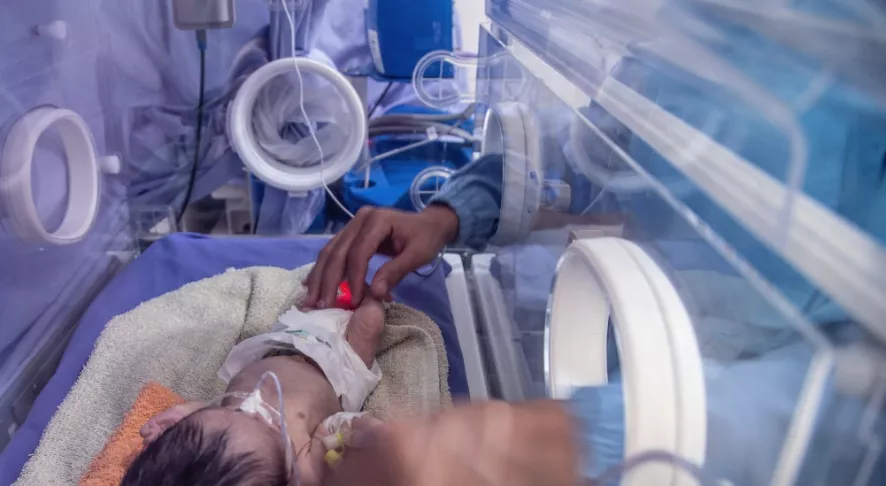GARDP at ESCMID Global 2024
GARDP presented the results of its latest research at the 34th Annual European Society of Clinical Microbiology and Infectious Diseases Global Congress (ESCMID Global 2024), held in Barcelona, Spain, from 27-30 April. These included the findings of several studies on neonatal sepsis, access and sexually transmitted infections (STIs). Notably, the positive phase 3 results for zoliflodacin, a new first-in-class antibiotic treatment for gonorrhoea, were presented for the first time at a scientific conference.
ESCMID Global is the premier congress in the field of infectious diseases, bringing together more than 15,000 experts from all over the world. These findings represent some of the progress GARDP is making in accelerating the development of, and access to, new antibiotic treatments, and reaching its goal of developing five new antibiotic treatments by 2025.
Below are summaries of the work presented. Please click on the abstracts to learn more:
SEXUALLY TRANSMITTED INFECTIONS
There are more than 82 million new gonorrhoea infections occurring globally each year, making it the second most common bacterial STI. Its resistance to antibiotics is on the rise and rapidly spreading. With only one remaining treatment option for this disease, GARDP is developing zoliflodacin, a new single-dose oral treatment for gonorrhoea.
Previous in vitro studies have shown zoliflodacin to be active against multidrug-resistant strains of Neisseria gonorrhoeae, including those resistant to ceftriaxone and azithromycin, with no cross-resistance with other antibiotics. In an oral presentation at ESCMID Global 2024, Alison Luckey, Senior Medical Lead for GARDP’s STI team, shared the positive phase 3 clinical trial results for zoliflodacin.

With a total 930 participants, including women, adolescents and people living with HIV, this was the largest clinical trial ever conducted for a new treatment against gonorrhoea. The trial included 16 trial sites in five countries, including Belgium, the Netherlands, South Africa, Thailand, and the US. A single oral 3g dose of zoliflodacin was shown to be effective at treating gonorrhoea infection and had a favourable safety profile compared with the current standard of care.
In addition to these topline results, GARDP also presented several posters on zoliflodacin, including one which looked at adverse events occurring during the phase 3 trial, and found them to be similar in frequency, profile and severity compared with the standard of care for gonorrhoea, with no new safety concerns.
Another poster looking at antimicrobial susceptibility to several antibiotics showed that bacterial isolates, responsible for gonorrhoea infection obtained from participants in the phase 3 trial, displayed globally high levels of resistance to ciprofloxacin and tetracycline, and continued good levels of activity for zoliflodacin.
Finally, a poster was also presented on the results of a phase 1 study examining the possible interactions between zoliflodacin and itraconazole, which is known to affect metabolism in the liver in ways that could impact the levels of zoliflodacin in the blood. The study found a relatively small effect in healthy adults, suggesting that with zoliflodacin such drug-drug interactions will be of no concern in the treatment of patients.
Read now:
- Pharmacokinetics of zoliflodacin in healthy participants in the presence of itraconazole suggest no clinically meaningful CYP3A4-mediated drug-drug interactions
- Oral zoliflodacin is non-inferior to a combination of ceftriaxone and azithromycin for treatment of uncomplicated urogenital gonorrhoea: results of a large global Phase 3 randomised controlled trial
- Safety profile of oral zoliflodacin for uncomplicated gonorrhoea in a Phase 3 trial
- Antimicrobial susceptibility of baseline Neisseria gonorrhoeae isolates from participants recruited in the global zoliflodacin Phase 3 randomised controlled trial

NEONATAL SEPSIS
Children and newborns are especially vulnerable to drug-resistant bacteria, with 1 in 5 deaths caused by antibiotic resistance occurring in children under the age of five, and up to 3 million newborns getting serious infections that lead to sepsis every year. GARDP is working to identify and develop new treatments for children, with special attention to newborns with sepsis, and provide data to inform treatment guidelines for this vulnerable group.
The rise and spread of antimicrobial resistance threatens to undermine the effectiveness of WHO-recommended antibiotics, particularly in low- and middle-income countries, where the burden of disease is the greatest. In a study involving more than 3,000 neonatal patients, GARDP researchers sought to examine the link between the susceptibility of bacteria to available antibiotics and mortality. In an oral presentation they found that while there was no conclusive evidence of an association between antibiotic coverage and mortality, mortality reductions were greater where there was reduced susceptibility to the antibiotic colistin.
Read now:

ACCESS
GARDP aims to improve access to essential antibiotic treatments that are effective against multidrug-resistant priority pathogens, particularly in low- and middle-income countries (LIMCs) where the burden of disease is high. Through its use of licensing agreements, for example, it is expanding access to cefiderocol, in order to make it available to people in up to 135 LMICs. Cefiderocol is a relatively new antibiotic that has been approved for use against complicated urinary tract infections (cUTIs), hospital-acquired bacterial pneumonia/ventilator-associated bacterial pneumonia (HABP/VABP) and serious infections caused by Gram-negative bacteria.
However, a key part of this entails assessing cefiderocol to see if it is active against multidrug-resistant bacterial strains that are common in these regions. In three in vitro studies, GARDP compared cefiderocol against isolates of multidrug-resistant (MDR) bacteria – carbapenem-resistant Acinetobacter baumannii (CRAB), carbapenem-resistant Pseudomonas aeruginosa (CRPA) and carbapenem-resistant Enterobacterales (CRE) – obtained from regions with a high burden of disease. Cefiderocol demonstrated good activity against all MDR isolates, suggesting that it could indeed be potentially considered as a therapeutic option in countries with a high burden of CRAB, CRPA and CRE infections.
In addition to the poster presentations detailing these results, Jennifer Cohn, Global Access Director for GARDP, discussed these findings and broader access issues in her presentation, “Access to reserve antibiotics in LMICs,” part of a 2-hour symposium, “Introduction of newer antibiotics in LMICs,” co-chaired by Manica Balasegaram, GARDP’s Executive Director.
Read now:
- Access to reserve antibiotics in LMICs
- In vitro activity of cefiderocol against carbapenem-resistant Acinetobacter baumannii (CRAB) clinical isolates from countries with high CRAB incidence, 2019-2022
- In vitro activity of cefiderocol against carbapenem-resistant Enterobacterales (CREs) clinical isolates from countries with high CRE incidence, 2019-2022
- In vitro activity of cefiderocol against carbapenem-resistant Pseudomonas aeruginosa (CRPA) clinical isolates from countries with high CRPA incidence, 2019-2022